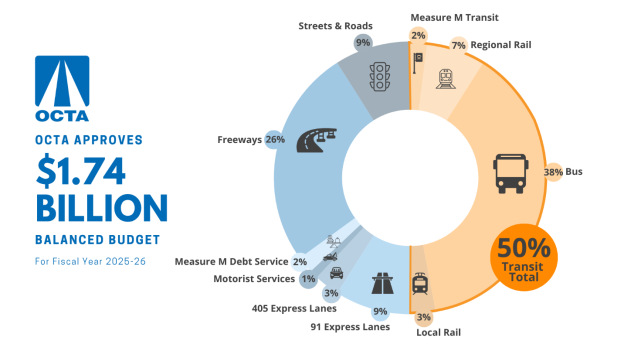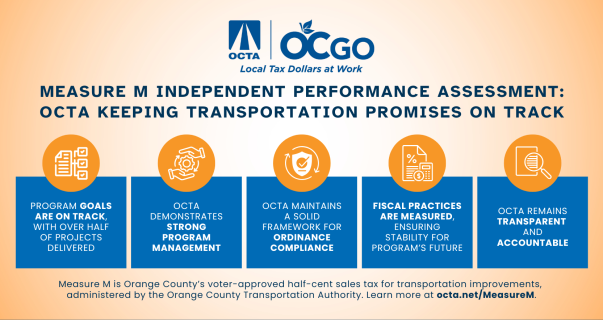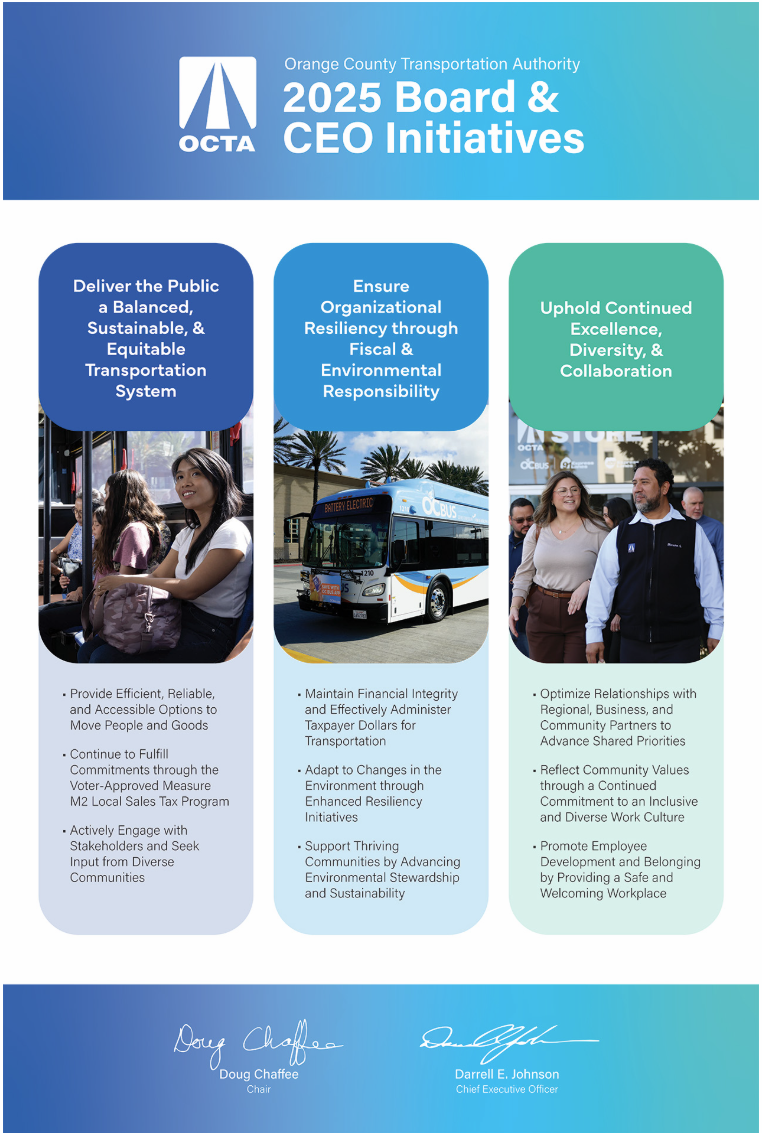Andrew Oftelie, Chief Financial Officer
Orange County Transportation Authority
Orange County Transportation Authority
Learn about Orange County Transportation Authority including our News & Press Releases, Projects, and Team.
Have questions? Reach out to us directly.
Learn about Orange County Transportation Authority including our News & Press Releases, Projects, and Team.
Since its formation in 1991, the Orange County Transportation Authority (OCTA) has kept residents and commuters moving throughout the 34 cities and unincorporated areas of Orange County. OCTA’s responsibilities, programs and services impact every aspect of transportation within the state’s third largest county.
OCTA keeps people moving by reducing freeway congestion, improving safety and efficiency on our local roads, providing bus service and regional multimodal connections, helping people find ways to leave their cars home, and providing safe, convenient transportation to those with special needs.
OCTA issues long-term debt primarily to finance a portion of the capital costs of the Orange County's transportation system through the Measure M2 Program. OCTA's M2 program is primarily used to fund the costs of transportation improvements, including freeways, streets and roads throughout Orange County, as well as fund multiple transit programs. Under the M2 Program, debt is secured by a 1/2 cent voter-approved sales tax (Measure M). OCTA has primarily issued debt to fund projects under M2's Freeway Program, accounting for 43% of net sales tax revenue.
In addition, OCTA issues long-term debt to finance the 91 Express Lanes. The 91 Express Lanes was first authorized as one of four public-private toll road projects by the State of California Legislature in 1989. Built at a cost of $135 million, the 91 Express Lanes opened in 1995. The 91 Express Lanes is a four-lane, 18-mile toll road in Orange and Riverside counties. Located in the median of SR-91 between the State Route 55 (SR-55)/SR-91 interchange and the SR-91/I-15 interchange, the toll road is jointly managed by OCTA and the RCTC.
_____________________________________________________________________________________________________
For more information on our OCTA 91 Express Lanes Revenue and OCTA Measure M2 Sales Tax Revenue bond programs, please click here
_____________________________________________________________________________________________________
Budget focuses on transit expansion, coastal rail resilience, and zero-emission investments amid economic uncertainty
ORANGE – The Orange County Transportation Authority Board of Directors today approved a balanced budget of $1.74 billion for the upcoming fiscal year that begins July 1 that keeps essential transportation improvements moving forward while responsibly planning for a balanced and sustainable transportation future for Orange County.
The approved budget makes significant investments in public transit – totaling approximately half of the overall budget – and makes improvements to Orange County’s freeways and streets to keep the county moving safely and efficiently. The budget accounts for focusing on coastal rail resiliency and will continue to fulfill the promises of Measure M, the county’s half-cent sales tax for transportation improvements.
Overall, the fiscal year 2025-26 budget is approximately a $20 million decrease compared to the previous year’s budget, reflecting OCTA’s commitment to fiscally conservative and prudent planning.
“I’m pleased to see OCTA move forward with a balanced budget that reflects both fiscal responsibility and a strong commitment to improving how Orange County moves,” said OCTA Chair Doug Chaffee, also the county’s Fourth District Supervisor. “Thanks to the diligent work of our Board and staff, we are continuing to invest in vital transit, street and freeway improvements that enhance mobility and quality of life for everyone who lives, works, and visits Orange County.”

Key highlights of the FY 2025-26 budget include:
Expanded Transit Offerings:
Additional OC Bus service to meet increasing demand, back to pre-pandemic levels
Start of OC Streetcar revenue service activities
Continued support for Metrolink rail service
Delivering on Measure M2 Commitments:
Measure M2 Next 10 Delivery Plan programs and projects remain on track
Formula and competitive programs continue to support the needs of cities and the county.
Sustainable and Resilient Priorities:
Continued investment in zero-emission buses and supporting infrastructure, including seven additional zero-emission buses.
Ongoing coastal rail resiliency planning and project implementation to protect vital transportation corridors
Consistent Express Lanes Operations:
91 Express Lanes and 405 Express Lanes continue to meet performance and financial commitments
A Guarded Economic Outlook:
Anticipated softening of sales tax receipts
Uncertainties in state and federal funding
Preservation of healthy reserve balances to mitigate potential revenue fluctuations
OCTA staff levels are scheduled to increase by about 31 employees – 27 of those coach operators to better serve the public’s public transit needs. Reflecting the cautious economic approach, 11 staff positions identified as having value for the agency will not be added at this stage but will be reconsidered if tax revenues are higher than expected during the fiscal year.
Measure M will continue to fund improvements to freeways – including SR-55, SR-57 and SR-91 – and to streets throughout Orange County, in addition to multiple transit and environmental programs. Transportation funds are provided to cities through formula and competitive funding.
The FY 2025-26 budget encompasses all services, projects and programs that are approved by the OCTA Board and administered by the agency.
Three-year review of Measure M, the half-cent sales tax for transportation, indicates OCTA has already delivered more than half of promised projects and remains on track
ORANGE – The Orange County Transportation Authority remains on track in the ongoing effort to successfully deliver the promises made to voters to improve Orange County’s transportation network, according to the recent findings of an independent Measure M2 Performance Assessment.
The assessment, covering the period from July 2021 to June 2024, was conducted by Sjoberg Evashenk Consulting and evaluated OCTA’s efficiency, effectiveness, and compliance in delivering transportation improvements funded through the half-cent sales tax initiative.
Measure M was first approved by voters in 1991 and overwhelmingly renewed in 2006. It is expected to result in approximately $14 billion of investments in Orange County’s transportation system through 2041, making improvements to local freeways and streets and to transit.
The report confirms that OCTA remains on track to fulfill its long-term commitments, having already delivered more than half of the program’s pledged projects since the renewed measure officially went into effect in 2011.
“The findings of this independent review reflect OCTA’s commitment to smart and responsible investments in Orange County’s transportation infrastructure,” said OCTA Chair Doug Chaffee, also Orange County’s Fourth District Supervisor. “Measure M continues to make a real difference in improving mobility, and we will continue to implement best practices to ensure efficiency, transparency, and fiscal prudence.”

Key Findings from the Performance Assessment
The report found that OCTA continues to make substantial progress toward meeting the measure’s six overarching goals, which include relieving traffic congestion, improving streets and freeways, expanding transit options, and protecting the environment.
OCTA was recognized for strong program management practices, ensuring that projects are delivered efficiently while safeguarding public funds. The agency was commended for maintaining sound fiscal practices, leveraging state and federal dollars efficiently, and successfully adapting to economic fluctuations.
The assessment also found that OCTA fully complies with all requirements outlined in the measure, including maintaining strict oversight of sales tax expenditures and conducting annual eligibility assessments for local jurisdictions. Additionally, OCTA was praised for its ongoing commitment to transparency and accountability in its communication with the Board of Directors, the Taxpayer Oversight Committee, and the public.
Ongoing Improvements and Recommendations
While no major deficiencies were identified, the consultant provided four recommendations for continued enhancement, including increasing clarity when updating project schedules and cost estimates, improving documentation regarding vendor selection processes, updating administrative policies to streamline the notice-to-proceed process, and faster processing of vendor payments to maintain efficiency.
OCTA has already taken steps to address these areas and will provide implementation updates in its quarterly reports on the Measure M program.
Since voters renewed Measure M in 2006, OCTA has conducted regular independent performance assessments every three years to ensure accountability. This sixth assessment continues the trend of positive reviews, reinforcing the agency’s commitment to fulfilling the promises made to Orange County voters.
For more information on the benefits provided by Measure M, visit octa.net/MeasureM.
OCTA Chair Doug Chaffee and CEO Darrell E. Johnson unveil action plan for OCTA to sustain and enhance an innovative transportation network for all Orange County
ORANGE – The Orange County Transportation Authority in 2025 will focus on continuing to deliver the public with a transportation network that is balanced, reliable and equitable, while remaining fiscally responsible and resilient.
Those guiding principles are part of the 2025 Board and CEO Strategic Initiatives and Action Plan, which was unveiled during Monday’s board meeting by OCTA Chair Doug Chaffee and CEO Darrell E. Johnson.
Each year, the newly selected chair works with the CEO to create and present the document that guides the agency’s efforts throughout the coming year. The initiatives are then presented to the full 17-member Board, which reviewed this year's plan on Monday.
"This action plan is our roadmap for how to deliver on the promises made to voters through Measure M, to provide a reliable and equitable transportation system,” said OCTA Chair Doug Chaffee, also the County’s Fourth District Supervisor. “I look forward to working with my colleagues on the Board to continue improving Orange County’s transportation network in the months ahead."
The overarching initiatives for OCTA in 2025 include:
To support those initiatives, OCTA staff presented to the Board an action plan with 109 planned milestones for the year.
“By laying out these priorities at the start of the year, we ensure that OCTA Board members and staff are working together on an ambitious, equitable and sustainable plan to keep Orange County moving safely and efficiently,” CEO Johnson said.

Have questions? Reach out to us directly.